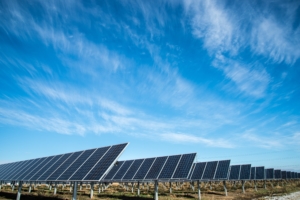
The interest in renewable energy is destined to escalate. Recently, the federal Investment Tax Credit (ITC) program enhanced the appeal for these types of projects while also expanding the scope.
The ITC program encourages private investment in renewable energy projects by offering lucrative incentives in the form of tax credits. For offshore wind projects, it is possible for investors to receive a 30 percent tax credit. A 26 percent tax credit is available for photovoltaic (PV) solar energy projects, and a 10 percent tax credit is available for investors of geothermal heat pump installations.
Benefits from the ITC program may diminish in 2023 and possibly expire altogether in two years. However, the incentives could be renewed. Whatever may happen in the future, public officials throughout the country are rushing to capitalize on this type of funding while the tax incentives for investors exist.
In Ann Arbor, Michigan, numerous solar projects with ITC eligibility are being promoted. City officials have budgeted $6 million for one project for construction of a new fire station that will be powered by renewable energy. The project includes geothermal heating and cooling, rooftop solar panels, EV chargers, and more for a new facility of 12,000 square feet.
City officials also have budgeted $5 million to expand the city’s renewable energy capabilities by installing solar panels on 16 public buildings. This large project is in the design stage. A few of the local buildings that will be retrofitted include the Ann Arbor Municipal Center, Gallup Canoe Livery, Burns Park Senior Center, and the city’s Farmers Market.
 Madison, Wisconsin, is budgeting more than $16 million for development of renewable energy projects. In 2022, a budget allocation of $2 million will enable city officials to carry out initial installations of solar PV panels on several public buildings, including a local library, fire station, office park, waste disposal plant, and housing shelter. Other installations will follow, and some will be individual projects such as a $1 million solar installation project at the State Street Capitol Garage.
Madison, Wisconsin, is budgeting more than $16 million for development of renewable energy projects. In 2022, a budget allocation of $2 million will enable city officials to carry out initial installations of solar PV panels on several public buildings, including a local library, fire station, office park, waste disposal plant, and housing shelter. Other installations will follow, and some will be individual projects such as a $1 million solar installation project at the State Street Capitol Garage.
California will launch an offshore wind project that will offer particularly lucrative ITC tax credits to investors. The state has assigned a budget of $45 million to the project, which is eligible for 30 percent tax credits.
The state of Hawaii has announced several large projects to build out solar energy facilities. One of the projects, the Kahana Solar Energy initiative, includes construction of a battery storage facility. Construction work is expected to start in the fourth quarter of 2022 with an anticipated completion deadline in 2023. Projects of this type are generally scoped in the $20 million range.
Officials in Hawaii also have announced a similar effort as part of the Barbers Point project. Work will include construction and installation of solar PV panels and an accompanying battery storage facility. Construction is expected to begin in late 2022, and there is an expected budget of at least $20 million.
Alexandria, Virginia, will kick off some renewable energy projects with an initial $6 million Emergency Power Systems plan. Some of the projects outlined include construction, replacement, and maintenance of emergency power systems for the city’s infrastructure operations. The project qualifies investors for lucrative tax credits because it includes development of battery storage systems, uninterrupted power supply upgrades, microgrid work, resiliency hub integrations, mobile generator interconnections, and solar supply sourcing. The project is in the design and engineering stage for the remainder of 2022 with construction planned for 2023.
In Oregon, a massively scaled renewable energy project with ITC eligibility will be launched in 2023. The Swan Lake Energy Storage Project, with a tentative budget that exceeds $800 million, will tap into the state’s resources for wind and solar energy. Combined with elements of solar energy, wind energy, and energy storage, the project will provide critical coverage for a region that includes Oregon and a few other areas of the Pacific Northwest. Construction on the project is scheduled to begin in 2023.
Along with large projects such as these, public officials also are launching smaller renewable energy projects that will qualify investors for ITC tax credits. The state of Washington allocated $100 million from its general fund to encourage smaller individual projects. Grant funding will be available to local government officials for projects that pair solar energy systems with energy storage utilities such as solar modules, solar inverters, and automated controls. Grant funding from the state is expected to cover design, predesign, and feasibility studies to upgrade existing renewable energy sources. The funding will prioritize awards for projects designed to develop new solar energy sources for overburdened communities, vulnerable populations, rural communities, and tribal communities.
A flurry of investment, planning, and construction activity is taking place to meet the deadline before these lucrative federal tax credits potentially expire for specific types of government projects. Mandates for clean energy, greener environments, and sustainability provide a driving motivation for public officials to launch as many of these projects as soon as possible while private-sector funding is available to them.
